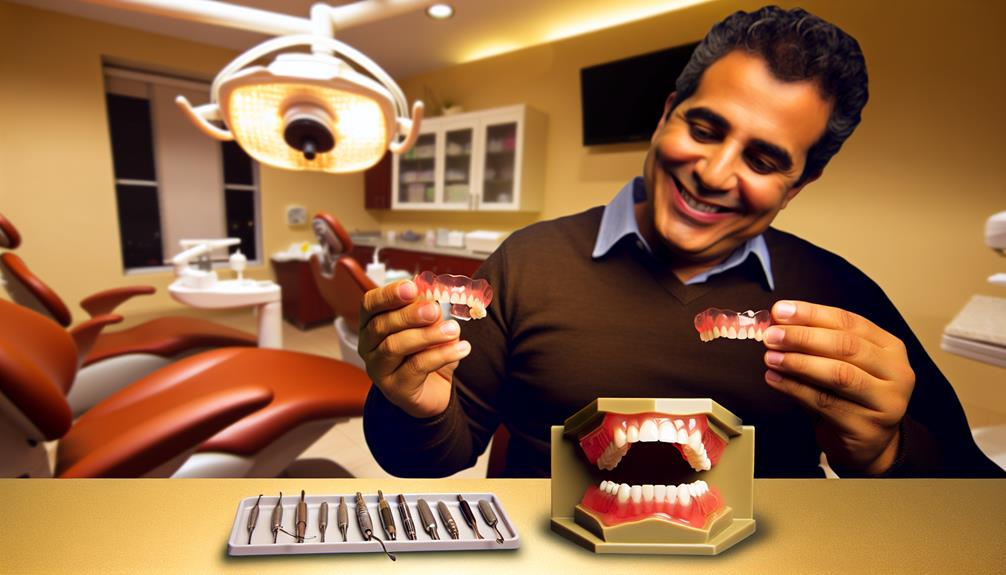Snap-in dentures offer a stable and comfortable alternative to conventional dentures, integrating dental implants for enhanced functionality. Initial consultations typically cost between $100 and $300, while installation ranges from $1,500 to $3,000, with additional expenses for anesthesia and follow-up adjustments. Materials vary in cost, with acrylic options at $300-$500, porcelain ranging from $1,000 to $3,500, and flexible nylon priced at $500 to $1,500. Ongoing maintenance and insurance coverage must also be considered, as they impact long-term costs. Understanding the full scope of expenses involved can guide patients in making informed choices on their dental care options.
Key Takeaways
- Initial consultations for snap-in dentures typically cost between $100 and $300, including examinations and diagnostic imaging.
- Installation expenses range from $1,500 to $3,000, with additional costs for anesthesia and follow-up appointments.
- Material options vary in price, with acrylic dentures costing $300 to $500 and porcelain dentures ranging from $1,000 to $3,500.
- Ongoing maintenance costs include cleaning supplies, repairs, and routine check-ups to ensure optimal function and hygiene.
- Insurance coverage for snap-in dentures varies, so it's essential to review individual plans and consult dental offices for coordination.
Understanding Snap-In Dentures
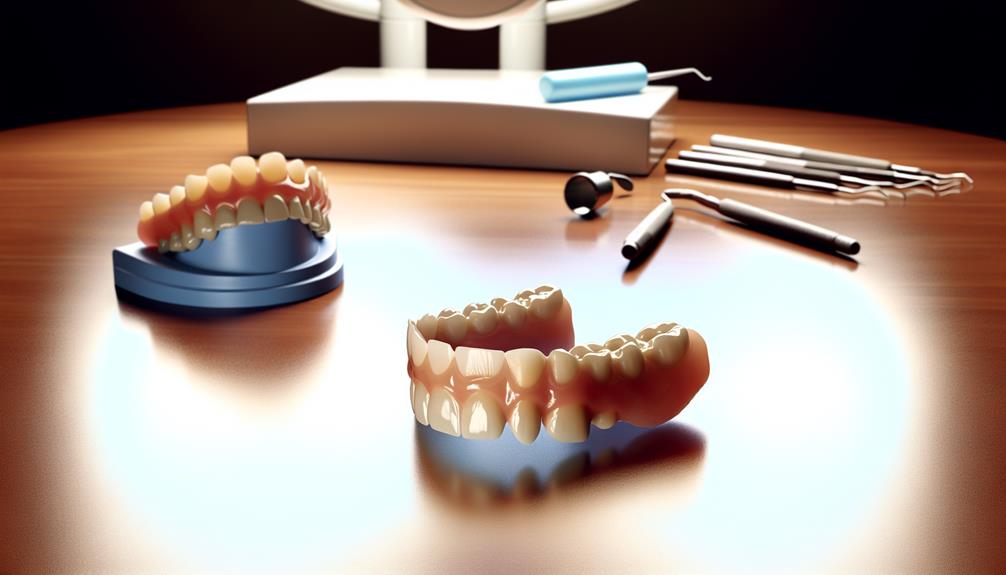
Although traditional dentures have long been a solution for tooth loss, snap-in dentures offer a more secure and comfortable alternative, catering to individuals seeking enhanced stability and functionality. These innovative dental appliances utilize a system of dental implants that anchor the dentures in place, considerably reducing issues related to movement and discomfort often experienced with conventional options. Chronic stress can impact overall health, including the immune system, which may affect recovery after dental procedures how stress affects health.
The benefits overview of snap-in dentures includes improved chewing efficiency, which allows patients to enjoy a wider variety of foods without fear of slippage. Additionally, these dentures can enhance facial aesthetics, as they help maintain the natural structure of the jaw and prevent bone loss over time. Many patients report increased confidence and a sense of belonging within their social circles, often sharing positive patient testimonials regarding their life-changing experiences post-treatment.
With their unique design, snap-in dentures provide a superior solution for individuals desiring both comfort and functionality. The ability to remove and clean them easily further adds to their appeal, making them a practical choice for those traversing the complexities of tooth loss. As the dental field continues to evolve, snap-in dentures represent an exciting advancement in restorative dentistry.
Initial Consultation Costs
The initial consultation for snap-in dentures is an essential step in the treatment process, as it sets the foundation for the subsequent procedures and costs involved. During this appointment, a thorough initial assessment will be conducted to evaluate the patient's oral health and specific needs. This helps to align patient expectations with achievable outcomes, ensuring a collaborative approach to treatment. It's important to recognize that this process can evoke a range of emotions, and being aware of these feelings can aid in coping effectively during this shift navigating emotional challenges.
Key components of the initial consultation costs may include:
- Comprehensive oral examination: The dentist will assess existing dental structures, gums, and any potential issues.
- Diagnostic imaging: X-rays or scans may be necessary to determine bone health and suitability for snap-in dentures.
- Discussion of treatment options: This is an opportunity for patients to voice their expectations and for the dentist to provide tailored recommendations.
Understanding these elements not only informs patients about the financial aspect but also enhances their engagement in the decision-making process. By approaching the initial consultation with clear expectations, patients can foster a sense of belonging and reassurance as they commence their journey toward achieving a functional and aesthetically pleasing smile with snap-in dentures.
Material Options and Prices
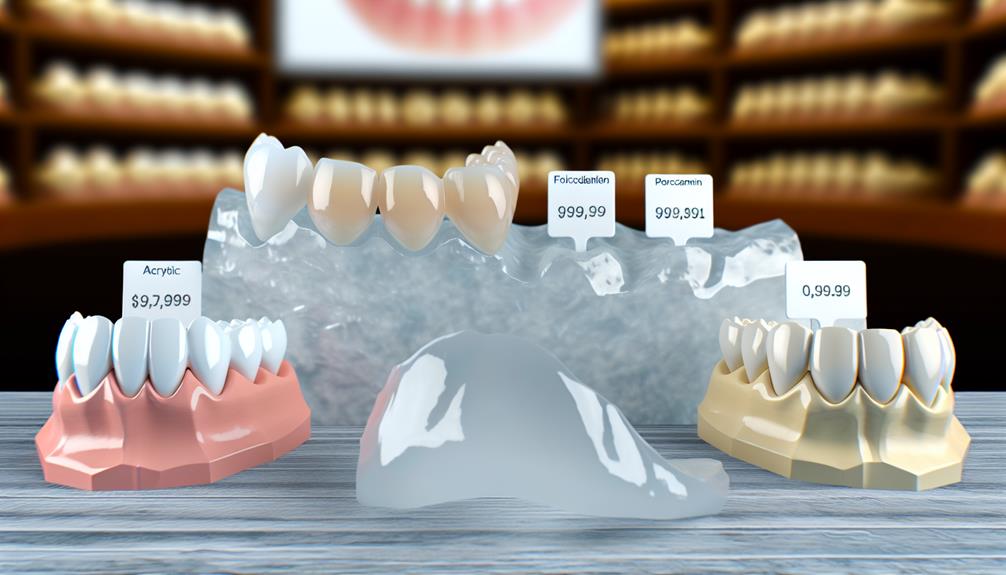
Several material options are available for snap-in dentures, each varying in price, durability, and aesthetic appeal. The most commonly used materials include acrylic, porcelain, and flexible nylon. Coping with the emotional aspects of choosing the right dental solution can be challenging; however, understanding the options available can help ease the decision-making process. Those facing dental changes can benefit from navigating emotional challenges as they consider their choices. Acrylic dentures offer a balance between affordability and aesthetic appeal, typically costing between $300 to $500. However, they may be less durable than alternatives, requiring more frequent replacements.
Porcelain dentures, while more expensive, often range from $1,000 to $3,500, providing superior material durability and a more natural appearance. Their resilience against wear and tear makes them a popular choice for patients seeking longevity in their dental solutions.
Flexible nylon dentures are gaining popularity due to their comfort, lightweight nature, and aesthetic appeal, with prices ranging from $500 to $1,500. These materials adapt well to the mouth's contours, enhancing patient comfort while providing adequate durability.
Ultimately, the choice of material should align with personal preferences and budget considerations. Patients are encouraged to consult with their dental professionals to determine the best material option that fulfills their needs while considering factors such as material durability and aesthetic appeal. This collaborative approach guarantees a more satisfying experience and outcome for patients.
Procedure and Installation Expenses
The costs associated with the procedure and installation of snap-in dentures encompass several key components, including initial consultation fees and the expenses incurred during the installation process. During the consultation, dental professionals assess the patient's oral health and discuss treatment options, which may involve additional diagnostic imaging. Understanding the potential for sleep disturbances can also be beneficial for patients considering dental procedures that might affect their overall well-being. Subsequently, the installation phase entails various costs related to the fabrication and fitting of the dentures, ensuring ideal functionality and comfort.
Initial Consultation Fees
While understanding the costs associated with snap-in dentures, it is essential to contemplate the initial consultation fees, which serve as a foundational step in the procedure. During this initial assessment, dental professionals evaluate the patient's oral health and discuss individual needs, enabling them to tailor a treatment plan that aligns with patient expectations.
The initial consultation typically includes:
- Thorough oral examination to assess existing dental structures
- Detailed discussion regarding treatment options and materials
- X-rays or imaging to better understand the anatomy of the mouth
These fees can vary widely based on the complexity of the initial assessment and the practitioner's expertise. On average, patients can expect to pay between $100 and $300 for this significant consultation. It is advisable to inquire about any included services, as some providers may bundle these assessments with the overall treatment costs. Understanding these initial fees is essential, as they lay the groundwork for the subsequent steps in the snap-in denture process. Clear communication with your dental provider can enhance the experience, ensuring that patient expectations are met and fostering a sense of belonging throughout the journey.
Installation Process Costs
Understanding the costs associated with the installation process of snap-in dentures is essential for patients preparing for this dental solution. The installation involves various techniques, each influencing the overall expense. Typically, the procedure encompasses several stages, including preliminary assessments, the actual installation, and follow-up appointments, which can greatly impact cost.
Here's a breakdown of common installation process costs:
| Expense Category | Estimated Cost Range | Notes |
|---|---|---|
| Preliminary Assessments | $100 – $300 | Includes diagnostic imaging |
| Installation Techniques | $1,500 – $3,000 | Varies by complexity and materials |
| Follow-Up Appointments | $50 – $150 per visit | Necessary for adjustments |
| Anesthesia and Sedation | $200 – $800 | Depends on patient needs |
| Additional Procedures | $200 – $1,000 | May be required for ideal results |
Patient experiences with snap-in dentures can vary, often influenced by the chosen installation techniques and the complexity of individual cases. Understanding these costs and their implications can empower patients to make informed decisions about their oral health, ensuring a successful shift to snap-in dentures.
Ongoing Maintenance Costs
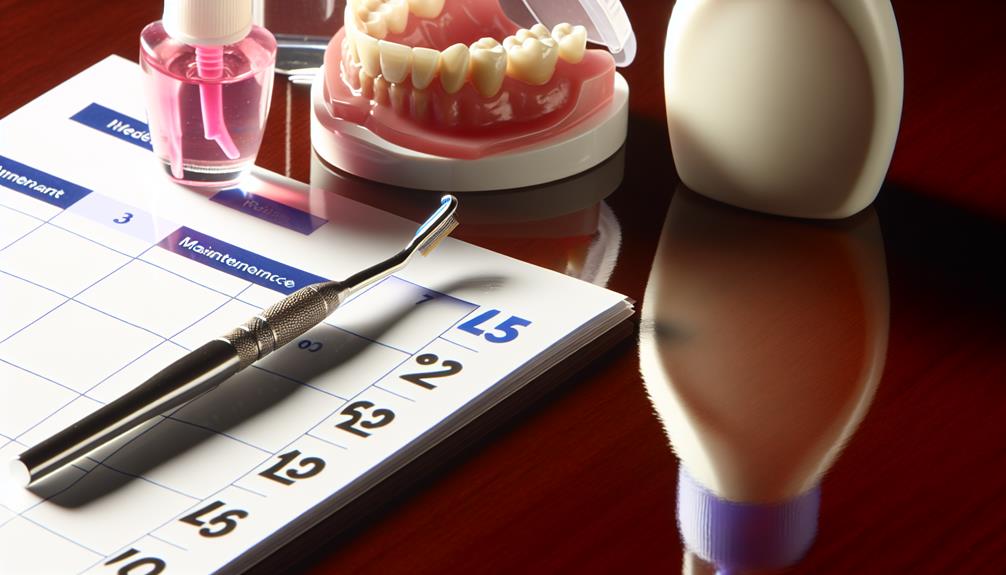
Maintaining snap-in dentures involves several ongoing costs that are vital for guaranteeing their longevity and functionality. These expenses can vary based on individual needs and the complexity of the dental appliance. Understanding these costs will help patients budget effectively while guaranteeing peak care for their dentures. Additionally, just as it is important to address issues like restless legs syndrome for overall well-being, proper maintenance of dentures is essential for comfort and health.
Key ongoing maintenance costs include:
- Cleaning Supplies: Regular cleaning is essential to prevent plaque buildup and maintain oral hygiene. Professional cleaning techniques or specialized cleansers may be required to keep the dentures in peak condition.
- Repair Services: Over time, snap-in dentures may require repairs due to wear and tear. Having a reliable dentist or dental technician for repair services guarantees that any issues are addressed promptly, preventing further complications.
- Routine Check-ups: Regular dental visits are important for monitoring the fit and function of snap-in dentures. These check-ups often include adjustments that may incur additional fees.
Insurance Coverage and Benefits
Maneuvering the intricacies of insurance coverage for snap-in dentures can be an essential step in managing the overall cost of dental care. Patients should begin by thoroughly reviewing their insurance plans, as coverage limits can vary considerably. A detailed benefits analysis will help identify what portion of the costs is covered, including any applicable dental riders that may enhance benefits for prosthodontics.
Understanding the claim process is vital. Many insurance plans require pre-authorization for treatments like snap-in dentures, ensuring that providers are within the network to minimize out-of-pocket costs. Familiarize yourself with the policy exclusions that may apply, as some plans may not cover specific types of dentures or the materials used.
Another important aspect is the reimbursement procedures, which vary among insurance providers. Patients should inquire about how claims are submitted and processed to avoid unexpected expenses. Consulting with a dental office that coordinates with network providers can streamline this process and provide clarity on potential costs. Ultimately, a proactive approach to understanding insurance coverage will empower patients to make informed decisions regarding their dental health and financial well-being.
Financing Options for Patients
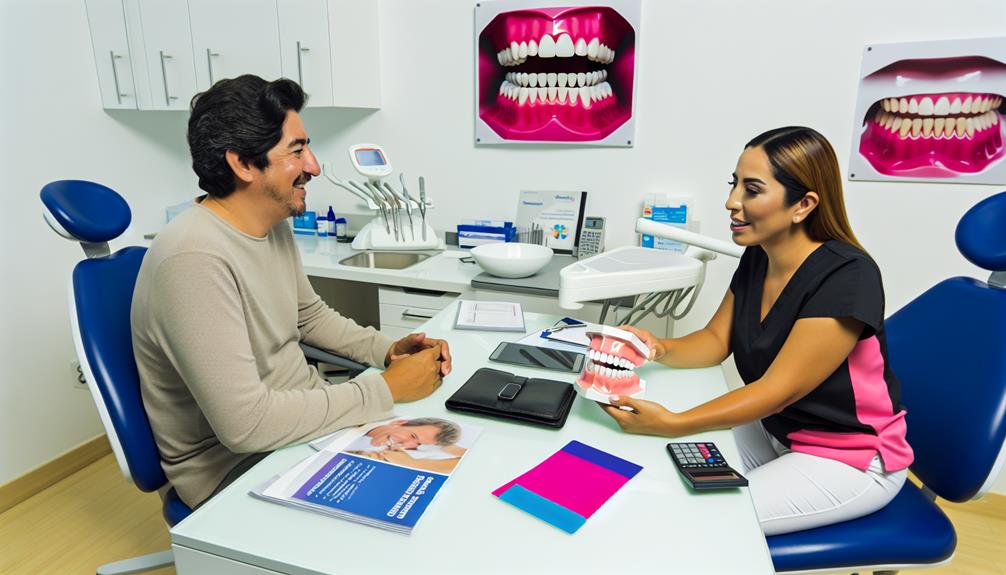
For many patients, managing the financial aspects of snap-in dentures can be challenging, but several viable financing options can help alleviate the burden. Understanding these options can empower individuals to make informed decisions regarding their oral health.
Many dental practices offer payment plans that allow patients to break down the total cost into manageable monthly installments. This flexibility can make the financial commitment less intimidating and more achievable for those on a budget.
Additionally, some practices may provide financing assistance through partnerships with third-party lenders. This can facilitate access to loans specifically for dental procedures, often with competitive interest rates.
Consider the following financing options:
- In-house payment plans: Many dental offices provide customized payment plans tailored to individual needs.
- Dental credit cards: Specialized credit cards, like CareCredit, are designed for medical expenses, offering promotional interest-free periods.
- Health savings accounts (HSAs): Utilizing HSAs can be a tax-advantaged way to cover dental expenses.
Comparing Alternatives to Snap-In Dentures
Numerous alternatives to snap-in dentures exist, each with distinct advantages and considerations tailored to individual patient needs. One prominent option is traditional dentures, which are removable and generally more affordable upfront. However, patients may experience challenges with fit and comfort, leading to lower patient satisfaction over time.
Dental implants represent another alternative, offering a more permanent solution that integrates with the jawbone. Implants vs dentures is a frequent topic of discussion, as implants can provide enhanced stability and functionality, often resulting in higher patient satisfaction. However, the initial investment for implants is considerably greater, and the procedure requires sufficient bone density.
Another alternative includes implant-supported dentures, which combine the benefits of both implants and traditional dentures. These offer improved stability while still being removable, catering to those desiring a balance between cost and functionality.
Ultimately, the choice between these alternatives hinges on various factors, including budget, personal comfort, and lifestyle. Conducting thorough research and consulting with dental professionals can empower patients to make informed decisions regarding their oral health and restorative options.
Long-Term Financial Considerations
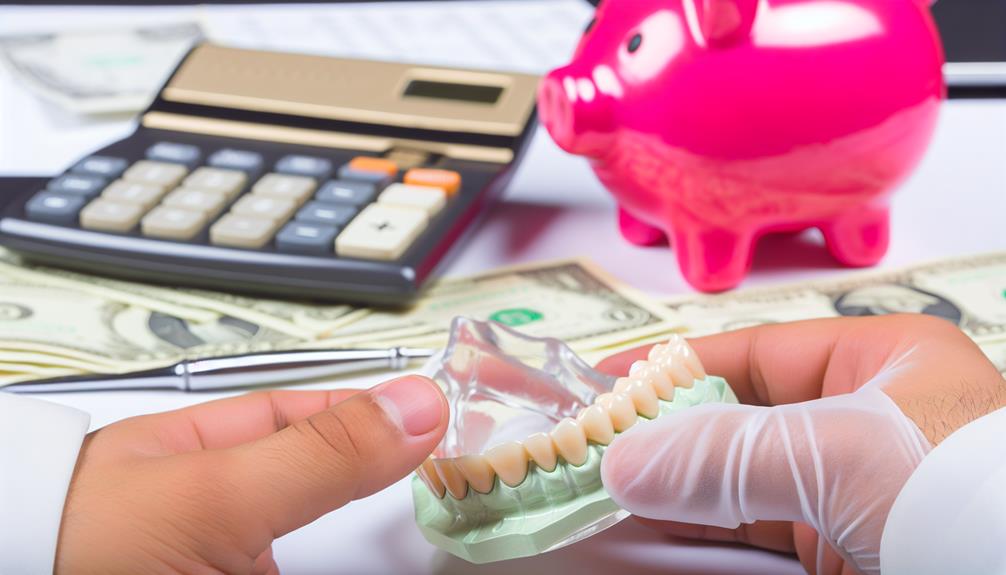
When evaluating snap-in dentures, it is essential to contemplate the long-term financial implications, including maintenance and replacement costs, which can considerably affect overall expenditure. Additionally, understanding the nuances of insurance coverage options is vital, as it may influence out-of-pocket expenses and long-term affordability. A thorough assessment of these factors will enable individuals to make informed decisions regarding their dental care investments.
Maintenance and Replacement Costs
Maintaining snap-in dentures involves ongoing costs that can greatly impact long-term financial planning. Patients should consider several factors that contribute to maintenance and replacement expenses. Regular cleaning techniques are vital for the longevity of these dental appliances. Utilizing proper brushes and cleaning solutions can prevent wear and enhance durability factors, ultimately reducing the frequency of necessary replacements.
Key considerations include:
- Cleaning supplies: Investing in high-quality cleaning solutions and tools is essential to preserve the integrity of snap-in dentures.
- Routine check-ups: Regular visits to your dental professional can help identify potential issues early, ensuring that your dentures remain functional and comfortable.
- Replacement cycles: Understanding the average lifespan of your snap-in dentures can help you budget for potential replacements, typically every 5 to 10 years.
Insurance Coverage Options
Understanding the financial implications of maintaining snap-in dentures extends beyond routine maintenance and replacement costs; it also encompasses the role of insurance coverage. Various insurance policy types, such as dental insurance, health savings accounts (HSAs), and flexible spending accounts (FSAs), can notably impact your out-of-pocket expenses for these dental prosthetics.
Typically, dental insurance plans may cover a portion of the costs associated with snap-in dentures, yet coverage limitations often apply. For instance, many policies impose waiting periods or caps on benefits, specifically for prosthetic devices. Additionally, some insurers may classify snap-in dentures as cosmetic rather than medically necessary, further complicating coverage options.
It's crucial to thoroughly review your insurance policy and consult with your provider to ascertain the specifics of your coverage. Understanding the nuances of what is covered can help you navigate the financial landscape more effectively and guarantee you are prepared for any additional costs. By being informed about your insurance options, you can make more empowered decisions regarding your dental health and align your financial planning accordingly.
Frequently Asked Questions
How Long Do Snap-In Dentures Typically Last?
Snap-in dentures typically last between 7 to 10 years, depending on various durability factors such as material quality, oral hygiene, and individual wear patterns. Regular maintenance, including proper cleaning and periodic adjustments by a dental professional, can greatly enhance their lifespan. Adhering to recommended maintenance tips, such as avoiding abrasive cleaners and scheduling routine check-ups, guarantees ideal performance and comfort, ultimately fostering a sense of belonging within a supportive dental care community.
Can I Eat Normally With Snap-In Dentures?
Yes, individuals can generally eat normally with snap-in dentures, although adjustments to eating habits may be necessary. Initially, patients might experience some dietary restrictions, particularly with hard or sticky foods, as these can dislodge the dentures. Gradually, most users can reintroduce a wider variety of foods as they become accustomed to the appliance. It is advisable to consult a dental professional for personalized recommendations to guarantee maximum comfort and functionality.
Are Snap-In Dentures Suitable for Everyone?
Determining the suitability of snap-in dentures involves thorough candidate evaluation, considering both dental health and lifestyle considerations. While these dentures provide improved stability and comfort compared to traditional options, not every individual may be an ideal candidate. Factors such as bone density, oral hygiene, and personal preferences play significant roles in this assessment. Consequently, a consultation with a dental professional is essential to tailor treatment options to the individual's unique needs and circumstances.
How Do I Clean Snap-In Dentures Effectively?
To effectively clean snap-in dentures, utilize non-abrasive cleaning solutions recommended by dental professionals. Begin by rinsing the dentures under warm water to remove food particles, followed by soaking them in a suitable cleaning solution for the specified time. Gently brush the dentures with a soft-bristle brush to eliminate plaque and debris. For ideal maintenance, store them in a moist environment when not in use, and regularly consult your dentist for personalized care tips.
What Is the Recovery Time After Installation?
The recovery time after installation of new dental appliances typically ranges from a few days to several weeks, contingent upon individual healing responses and complexity of the procedure. During this period, effective post installation care is paramount, which includes maintaining oral hygiene and adhering to dietary recommendations. Pain management may involve over-the-counter analgesics and cold compresses to alleviate discomfort. Regular follow-ups with your dental professional can guarantee ideal recovery and adjustment to the new appliance.

